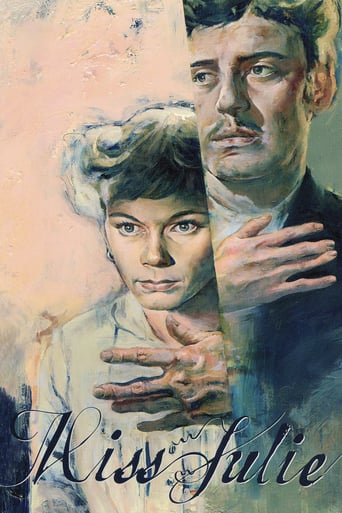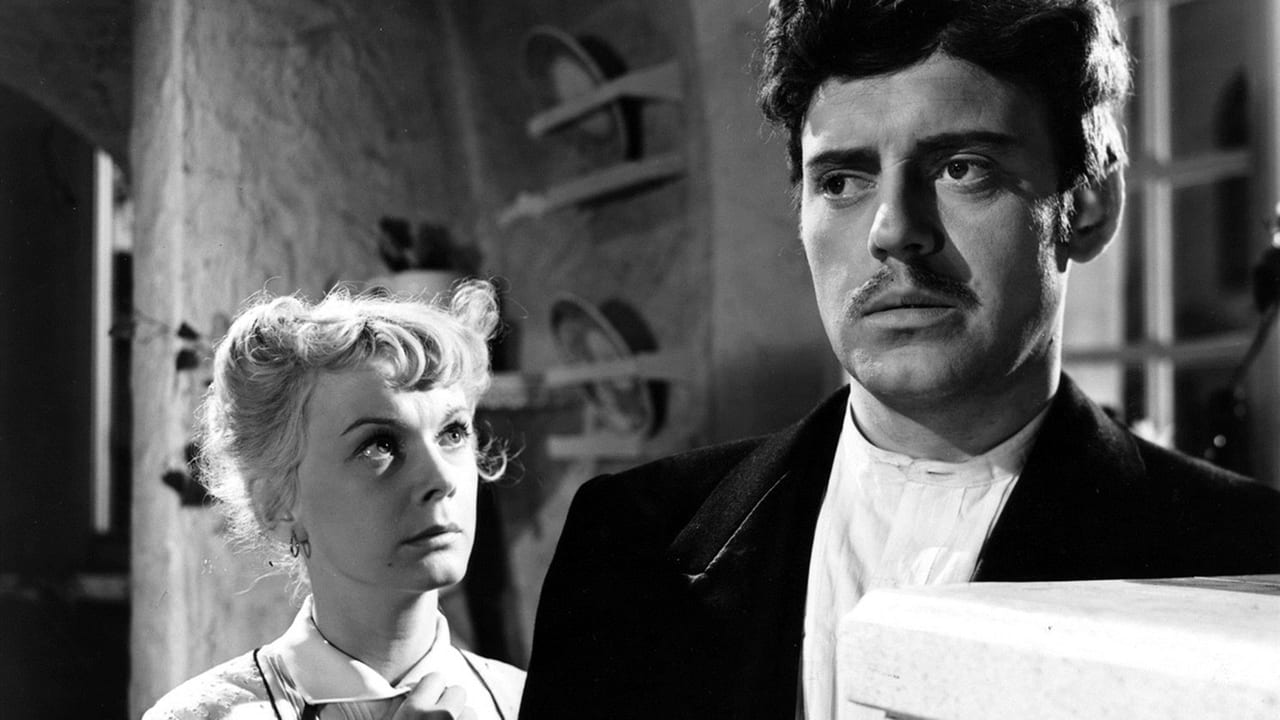gavin6942
The young miss Julie (Anita Bjork) lives in a mansion with her father. She has recently broken her engagement but is attracted to one of the servants, Jean. They spend the midsummer night together, telling each other their memories and of their dreams. Realizing that an affair between a man of the people and an aristocrat is impossible, they plan to escape to Switzerland.This film had an interesting influence abroad. Alfred Hitchcock said he had hired Björk as the female lead for "I Confess" in 1952, after seeing her in "Miss Julie". However, when Björk arrived in Hollywood with her lover Stig Dagerman and their baby, Jack Warner, head of Warner Brothers, insisted that Hitchcock find another actress.What makes this is a great film, beyond the absolutely gorgeous cinematography, is the intrinsic idea of class division. It had been done before and has been done since, but it is a theme that seems to be eternal and always a joy to watch when properly executed.
kijii
Sjöberg is able to capture complex subjects, at several levels. He does this by moving back and forth in time, capturing reminiscences, dreams, present events, and future imaginings through seemingly seamless film techniques. Yet, the techniques never disrupt the story (which takes place over one day). On the contrary, the viewer is caught 'up in the act' and feels as if he is seeing or experiencing it as it unfolds in the characters' minds. Camera angles, cutaways, use of light and shadow, good acting, and. just about anything you can imagine about good film making is used just here to enhance ideas and feelings. I particularly loved the close ups of children's faces that constantly show the wonder and surprise. (There is a similar look in Julie's eyes as she spies on a working class couple having sex in the barn.) The mood of the film is generally sunny and bright since it takes place on a folk holiday full of fun and merrymaking, Midsummer's Eve Themes of this film concern the characters' roles and stations in life; how their stations influences the way they see things; and the hypocrisy of the strict class structure in late 19th Century Sweden. The film also involves the roles of women and men of the Swedish upper class. This is demonstrated by showing Julie's mother—in retrospect--as an extreme iconoclast of the traditional gender roles—trying to raise Julia as a boy until her father finally interferes. The lead roles are brilliantly played by Anita Björk (as Miss Julie) and Ulf Palme (as her servant, Jean). The two only come into social contact after Miss Julie breaks off her engagement with her fiancé and then crashes the working folk's Midsummer's Eve barn dance. Once there, she dances with the embarrassed and angry Jean. Later, as Julie and Jean relate their dreams and pasts to each other--each full of twists and turns--the gap between their social stations appears to break down. However, this apparent bridge has its own twists and turns. Look for a young Max von Sydow in this 1951 movie as a "hand." He is still acting and going strong!! I have seen him in SO many movies over the years and he almost always makes the movie better. I have seen other versions of this Strindberg play brought to film--most recently Liv Ullmann's 2014 version with Jessica Chastain, Colin Farrell, and Samantha Morton. However, none seems to give me a more satisfying enjoyment of the play than the old black-and-white version reviewed here.
lasttimeisaw
It's double-bill time, two movie adaptations of MISS JULIE, August Strinberg's play written in 1888, with 63 years apart. The 1951 version is made by Strinberg's fellow Swedish countryman, Alf Sjöberg. Shot in dashing Black and White, Sjöberg's film stars Anita Björk and Ulf Palme as the central pair, Miss Julie, the daughter of a Count (Henrikson) and her servant Jean, during the mid-summer night, they test the limit of seduction, passion and dignity between two incompatible classes, it shared the prestigious Grand Prize in Cannes with Vittorio De Sica's MIRACLE IN MILAN (1951).Empowered by an impactful score from Dag Wirén, the film conjures up the pair's gender-and- class tug-of-war with a phantasmagoria of sequences narrating their dreams and past. The desire for falling versus an ambition of climbing from different starting tier concretes Julie and Jean as perfect specimens to explore their moral and emotional clashes. Outstanding cinematography creates amazing shots where flashback merges together with the present, imagination coexists with the reality. There is no win-win situation in the battle of sex, Miss Julie's paradoxical attempt to patronise her servant and at the same time to be sexually overtaken by him is a self-digging grave for her own undoing, and Jean's struggle between his sexual impulse and deep-rooted inferiority complex is the last nail on her coffin.Anita Björk embodies a graceful mien of nobility emitting a whiff of recalcitrance that makes her portrayal of Miss Julie a distant, spoiled figure never truly reveals her true emotions, whereas Ulf Palme delicately betrays his insecurity and immaturity out of his pseudo-confidence and prince-charmant appearance. Among the supporting cast, Dorff's Kristin, the cook, takes a less prominent function than Morton in the 2014 film, and we also see a very young Max von Sydow giggling in his plain nature. Overall, this vintage oldie is a pleasant discovery, especially compared to the more lyrical but problematic latest version directed by the acting legend Liv Ullmann.With a running time around 130 minutes (contrast with 89 minutes of Sjöberg's picture), but maximally axing the bit parts with three characters only (save the two-minutes opening sequence showing a young Julie rollicking in the forest), Miss Julie (Chastain), the butler John (Farrell) and Kathleen the cook (Morton), this austere version is set in Ireland, and is much more loyal to the text's original form with its take-no-prisoners' method to let the acting-trio wrangling in the turmoil with lengthy monologues and dialogues. It is a chancy choice, Ullmann invests a full trust in her cast, and is willing to take the risk of prolonging the takes to let the emotional repercussions permeate, even music is barely used as an immediate mood-mediator, only at times playing in the background with unobtrusive volume."The night is long and it is so tiring", the film becomes tedious as the same plot and twist blathering on and on; and "class is class", the invisible barrier strips them down to their inveterate bias and beliefs. However, the trio's whole-hearted devotion is the saving grace of Ullmann's labour-of-love. Morton, her Kathleen becomes a morally righteous yardstick to the scandalous affair, John is her beau, and Miss Julie is her mistress, her inward feeling is given a more detailed vent to show off, and Morton is always excellent to watch, modest in looks, but tremendously engaging. Farrell, portrays a quite different character from Palme, his John is more approachable to read, more pliable to manipulate, also more reprehensible to condemn for his cowardice, the explicit canary-murdering scene makes him more like a perpetrator than a foolish social-climber in the end.Chastain stands at odds with Farrell and Morton's Irish accent, but her mercurial personae are wondrous to stare, this could be a tour-de-force if it was on stage, yet as a film, her labour (the same can to said to Farrell and Morton) cannot redeem the sluggish rhythm and a length overstays its welcome, in a sense, only true savant of stage play can luxuriate in it, for most people, the 1951 version is more superior.
Howard Schumann
Based on a well-known play by August Strindberg, Alf Sjoberg's Miss Julie depicts the struggle for survival between classes and genders in late 19th century Sweden that leads to confusion and tragedy. Because of its frank portrayal of sex between a lower-class servant and an upper-class aristocrat, the play was banned in Europe until 1906 and in Britain until 1939. It is highly regarded, however, as an important work in the literary genre that became known as Naturalism. Compellingly played by Anita Bjork who completely captures her character's erratic willfulness, Miss Julie, the 25-year old daughter of Count Carl (Anders Henrikson) is estranged from the society in which she grew up and fights against the restrictions placed on her because of her status.Julie is a rebel who treats social conventions of the time with disdain, though she still demands to be treated as a proper woman. Having recently broken up with her fiancé (Kurt-Olof Sundström) after what would now be called an S&M incident in which she literally makes him jump through hoops like a trained dog, she is open for sexual adventure. The adventure she finds takes the form of the handsome butler Jean (Ulf Palme) whom she seduces following the drunken revelries celebrating Midsummer Eve, a pagan ritual. It is an act which, though only mildly reprehensible today, was viewed as depraved in Strindberg's time and led to the author's characterization of Julie as being "sick".Although Jean is engaged to the cook, Christine (Marta Dorff), neither Jean nor his fiancé object because they see the act as an honor due to Julie's social position. The seduction, however, leads to her loss of respect from the servants as well as the loss of her own self respect. To escape from their untenable situation, the two lovers talk about leaving on the next train to Switzerland where Jean fantasizes about owning a hotel but the tangled web they have woven leads to unforeseen consequences.One of the highlights of the film for me was the seamless inter-mixing of dream intervals and flashbacks from childhood. In her dream, Miss Julie is high up on a ledge or mountain. She can no longer hold on but lacks the courage to come down, though she has a longing to fall. Jean, on the other hand, wants to climb a high tree but is unable to reach the top. In flashbacks, Miss Julie recalls how her mother Berta (Lissi Alandh) saw herself as a feminist who was opposed to marriage and only wanted to be the count's mistress. When she gave birth to a daughter, she exacted her revenge by raising the girl as a boy and carrying on various misdeeds until the estate went bankrupt.Despite its anachronistic and morbid social outlook, Sjoberg's Miss Julie is not a grim experience. The director lightens it up considerably with country scenes of folk dancing, horseback riding, and rowing, all in an idyllic setting, beautifully photographed by Goran Strindberg. Though it reflects Strindberg's distorted view of women as hysterics, Miss Julie is a superb film and a treat for the senses, both visually magnificent and wonderfully performed. It has a well-deserved reputation as being one of the greatest Swedish films of all time.


 AD
AD

